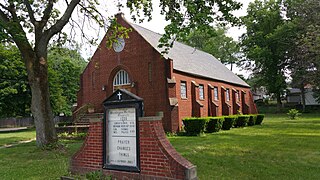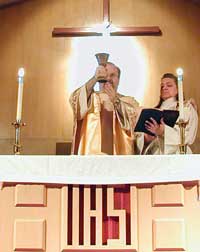Related Research Articles
Methodism, also called the Methodist movement, is a Protestant Christian tradition whose origins, doctrine and practice derive from the life and teachings of John Wesley. George Whitefield and John's brother Charles Wesley were also significant early leaders in the movement. They were named Methodists for "the methodical way in which they carried out their Christian faith". Methodism originated as a revival movement within Anglicanism with roots in the Church of England in the 18th century and became a separate denomination after Wesley's death. The movement spread throughout the British Empire, the United States and beyond because of vigorous missionary work, and today has about 80 million adherents worldwide.

In Christian theology, "legalism" is a pejorative term applied to the idea that "by doing good works or by obeying the law, a person earns and merits salvation." The term has been criticized by certain Christian traditions, such as Conservative Anabaptists who have said that being a disciple of Jesus means being obedient to New Testament commands, and the same is "crucial evidence that an individual has repented, believed, and yielded to Christ."
The Methodist Episcopal Church (MEC) was the oldest and largest Methodist denomination in the United States from its founding in 1784 until 1939. It was also the first religious denomination in the US to organize itself nationally. In 1939, the MEC reunited with two breakaway Methodist denominations to form the Methodist Church. In 1968, the Methodist Church merged with the Evangelical United Brethren Church to form the United Methodist Church.
The Holiness movement is a Christian movement that emerged chiefly within 19th-century Methodism, and to a lesser extent influenced other traditions such as Quakerism, Anabaptism, and Restorationism. Churches aligned with the holiness movement teach that the life of a born again Christian should be free of sin. The movement is historically distinguished by its emphasis on the doctrine of a second work of grace, which is called entire sanctification or Christian perfection. The word Holiness refers specifically to this belief in entire sanctification as an instantaneous, definite second work of grace, in which original sin is cleansed, the heart is made perfect in love, and the believer is empowered to serve God. For the Holiness movement, "the term 'perfection' signifies completeness of Christian character; its freedom from all sin, and possession of all the graces of the Spirit, complete in kind." A number of Christian denominations, parachurch organizations, and movements emphasize those Holiness beliefs as central doctrine.
The Wesleyan Church, also known as the Wesleyan Methodist Church and Wesleyan Holiness Church depending on the region, is a Methodist Christian denomination in the United States, Canada, the United Kingdom, South Africa, Namibia, Sierra Leone, Liberia, Indonesia, and Australia. The church is aligned with the Wesleyan-Holiness movement and has roots in the teachings of John Wesley. It adheres to Wesleyan-Arminian doctrine and is a member of the World Methodist Council.
The Twenty-five Articles of Religion are an official doctrinal statement of Methodism—particularly American Methodism and its offshoots. John Wesley abridged the Thirty-nine Articles of the Church of England, removing the Calvinistic parts among others, reflecting Wesley's Arminian theology.

The Wesleyan Methodist Church was a Methodist denomination in the United States organized on May 13, 1841.

The conservative holiness movement is a loosely defined group of theologically conservative Christian denominations with the majority being Methodists whose teachings are rooted in the theology of John Wesley, and a minority being Quakers (Friends) that emphasize the doctrine of George Fox, as well as River Brethren who emerged out of the Radical Pietist revival, and Holiness Restorationists in the tradition of Daniel Sidney Warner. Schisms began to occur in the 19th century and this movement became distinct from parent Holiness bodies in the mid-20th century amid disagreements over modesty in dress, entertainment, and other "old holiness standards". Aligned denominations share a belief in Christian perfection, though they differ on various doctrines, such as the celebration of the sacraments and observance of ordinances, which is related to the denominational tradition of the specific conservative holiness body—Methodist, Quaker, Anabaptist or Restorationist. Many denominations identifying with the conservative holiness movement, though not all, are represented in the Interchurch Holiness Convention; while some denominations have full communion with one another, other bodies choose to be isolationist.
Outward holiness, or external holiness, is a Wesleyan–Arminian doctrine emphasizing holy living, service, modest dress and sober speech. Additionally, outward holiness manifests as "the expression of love through a life characterised by ‘justice, mercy and truth’." It is a testimony of a Christian believer's regeneration, done in obedience to God. The doctrine is prevalent among denominations emerging during the revival movements, including the Methodists, as well as Pentecostals. It is taken from 1 Peter 1:15: "He which hath called you is Holy, so be ye holy in all manner of conversation."

The Evangelical Methodist Church (EMC) is a Christian denomination in the Wesleyan-Holiness tradition headquartered in Indianapolis, Indiana. The denomination reported 399 churches in the United States, Mexico, Burma/Myanmar, Canada, Philippines and several European and African nations in 2018, and a total of 34,656 members worldwide.

The General Conference, in several Methodist denominations, is the top legislative body for all matters within the denomination.

An elder, in many Methodist churches, is an ordained minister that has the responsibilities to preach and teach, preside at the celebration of the sacraments, administer the church through pastoral guidance, and lead the congregations under their care in service ministry to the world.
The Evangelical Church of North America (ECNA) is a Wesleyan-Holiness, Protestant Christian denomination headquartered in Clackamas, Oregon. As of 2000, the Church had 12,475 members in 133 local churches. The Church sponsors missionaries in seven countries.
Methodist viewpoints concerning homosexuality are diverse because there is no one denomination which represents all Methodists. The World Methodist Council, which represents most Methodist denominations, has no official statements regarding sexuality. Various Methodist denominations themselves take different stances on the issue of homosexuality, with many denominations holding homosexual practice to be sinful, while other denominations ordain LGBT clergy and marry same-sex couples. The positions of the various Methodist denominations around the globe are outlined in this article.

Wesleyan theology, otherwise known as Wesleyan–Arminian theology, or Methodist theology, is a theological tradition in Protestant Christianity based upon the ministry of the 18th-century evangelical reformer brothers John Wesley and Charles Wesley. More broadly it refers to the theological system inferred from the various sermons, theological treatises, letters, journals, diaries, hymns, and other spiritual writings of the Wesleys and their contemporary coadjutors such as John William Fletcher, Methodism's systematic theologian.
The Allegheny Wesleyan Methodist Connection (AWMC) is a Methodist denomination within the conservative holiness movement. It is primarily based in the United States, with missions in Peru, Ghana, and Haiti. The Allegheny Wesleyan Methodist Connection is currently led by Rev. David Blowers (President) and Rev. Joseph Smith.

The history of Methodism in the United States dates back to the mid-18th century with the ministries of early Methodist preachers such as Laurence Coughlan and Robert Strawbridge. Following the American Revolution most of the Anglican clergy who had been in America came back to England. John Wesley, the founder of Methodism, sent Thomas Coke to America where he and Francis Asbury founded the Methodist Episcopal Church, which was to later establish itself as the largest denomination in America during the 19th century.

Teetotalism is the practice or promotion of total personal abstinence from the consumption of alcohol, specifically in alcoholic drinks. A person who practices teetotalism is called a teetotaler or teetotaller, or is simply said to be teetotal. Globally, almost half of adults do not drink alcohol. A number of temperance organisations have been founded in order to promote teetotalism and provide spaces for non-drinkers to socialise.
The Global Methodist Church is a Methodist denomination within Protestant Christianity subscribing to views that were propounded by the conservative Confessing Movement. The denomination is headquartered in the United States and has a presence internationally. The Global Methodist Church was created as a result of a schism with the United Methodist Church, after members departed to create a denomination seeking to uphold "theological and ethical Christian orthodoxy."
References
- ↑ "Glossary: Book of Discipline, The". The United Methodist Church . Retrieved 28 May 2021.
A fundamental book outlining the law, doctrine, administration, organizational work and procedures of The United Methodist Church. Each General Conference amends The Book of Discipline, and the actions of the General Conference are reflected in the quadrennial revision. Often referred to as The Discipline.
- ↑ Neely, Thomas Benjamin (1924). Vital Points in the Methodist Episcopal Church. E. A. Yeakel. p. 121.
Throughout all the ecclesiastical changes under James VI, Knox' Book of Common Order and the Second Book of Discipline had held their place as containing the authorative declaration of the polity and ritual of the Church.
- ↑ Ward, Sir Adolphus William (1907). Cambridge Modern History. Macmillan. p. 494.
- ↑ Dunlap-Berg, Barbara (20 June 2012). "GC2012: How Book of Discipline comes to be". United Methodist News Service. Retrieved 28 May 2021.
- ↑ Sigler, R. Matthew (4 July 2018). Methodist Worship: Mediating the Wesleyan Liturgical Heritage. Taylor & Francis. ISBN 978-0-429-95992-9.
Since 1784, American Methodists have followed a Book of Discipline under various titles in maters of church law and doctrine.
- ↑ The Discipline of the Allegheny Wesleyan Methodist Connection (Original Allegheny Conference). Salem: Allegheny Wesleyan Methodist Connection. 2014.
- ↑ The Discipline of the Evangelical Wesleyan Church. Evangelical Wesleyan Church. 2015.
- ↑ Doe, Norman (12 September 2013). Christian Law: Contemporary Principles. Cambridge University Press. p. 407. ISBN 978-1-107-46986-0.
- ↑ Discipline of the Immanuel Missionary Church. Shoals, Indiana: Immanuel Missionary Church. 1986.
- ↑ The Discipline of the Wesleyan Methodist Connection, of America. Wesleyan Methodist Connection of America. 1858.